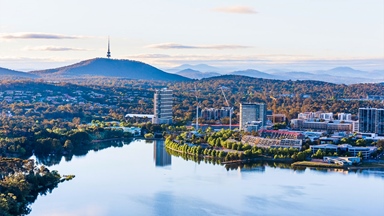Loading component...
At a glance
ACT Chief Minister and Treasurer Andrew Barr delivered his 11th budget this week, revealing that the strong local economic rebound from the COVID lockdowns had lifted consumption and enabled government spending focused on developing knowledge-based jobs to tackle the local skills shortage, public health initiatives and improving housing affordability.
Barr’s budget unveiled a 2021/22 deficit of $580.4 million, $371.1 million lower than forecast, with deficits reducing in following years down to $229.4 million by 2025/26.
Helping the budget bottom line was a population increase of 85,000 over the last ten years, a number 22,000 more than expected, which had increased revenues.
While Canberra’s economy had rebounded, the budget papers also forecast lower economic growth of 3 per cent this financial year, down from the 3.25 per cent forecast previously.
“We face economic challenges, particularly in the short term, with a softening of the national economic outlook as business and consumer confidence is impacted by the current spike in inflation and the lifting of the cash rate by the Reserve Bank of Australia,” the budget papers said.
While sounding a note of caution, the government also said the ACT economy had “outperformed expectations, demonstrating resilience and flexibility” in the face of the pandemic and other national and global events.
Skills shortages front and centre
Key initiatives include an allocation of $35 million over four years to support jobs, including $22.4 million to develop knowledge intensive sectors such as the commercialisation of research and innovation.
CPA Australia Senior Manager Tax Policy Elinor Kasapidis said that while she welcomed initiatives to address Canberra’s skills shortage, there was “no silver bullet” to the challenge.
The budget reveals there were 12,300 job vacancies in the ACT, including roles for accounting and business professionals, compared with 7460 unemployed people.
Find out more
“Last year there was no focus on the ACT’s professional skills shortage,” said Kasapidis.
"This year, there has been a renewed effort to address some of these concerns. We are glad the ACT Government has the appetite to address some of this problem.”
Infrastructure, housing and health

Infrastructure investment continues to be a focus, with the budget allocating $1.4 billion in 2022/23 and $7 billion over five years for new projects in the health, education and emergency services sectors.
Other initiatives include $390 million for public health services, encompassing $60 million for the pandemic response, while there is funding for an additional 400 health care workers.
Mental health was identified as an area of concern, largely as a result of the pandemic, and the budget earmarks $70 million over four years for mental health programs.
The budget also addresses home supply and affordability, with 30,000 new dwellings planned in the next five years to take the total supply to 210,000 dwellings.
This will, however, see the ACT’s net debt almost double to $9.8 billion over the next four years.
“They’re assets that we need to build now, and so it is appropriate to borrow in order to build those assets, and that the users of those assets over the decades and sometimes centuries ahead will make a contribution to that cost over time,” Barr said.
Energy, transport and tourism

The ACT already sources 100 per cent renewable energy, and the budget turns the government’s attention on the use of fossil fuels for transport and heating.
Canberra’s gas and diesel buses will be phased out over time, replaced by electric buses, and there are incentives for personal EVs in free registration and stamp duty.
These incentives are part of a goal for 90 per cent of new vehicles in the ACT car fleet to be electric by 2030, up from only 5 per cent currently.
ACT Government offices will replace gas heating with electric, and low-income Canberrans will be funded to replace gas heaters and also install insulation.
The government is also investing in tourism, boosting funding for the flagship Floriade and Enlighten events and for major art exhibitions.
In terms of receipts, the budget papers showed revenue from property stamp duty will fall to 10 per cent by 2025/6, down 26 per cent a decade ago, as the government changes to a rates-based system. Rates will increase by 2.5 per cent on average, meaning that residents will pay $111 per year more for houses, and $67 more for units.
Fire and emergency levies will also be increased by 3.25 per cent and the safer families levy will be increased by $5.
The betting operations tax, which is paid by casinos and operators of poker machines, increases from 15 per cent to 20 per cent, a move the government says will improve the economy and also the “wellbeing” of citizens.
The ACT introduced a Wellbeing Framework into its budget process in 2019, developing 12 Wellbeing Indicators which are now factored into cabinet decision making.

